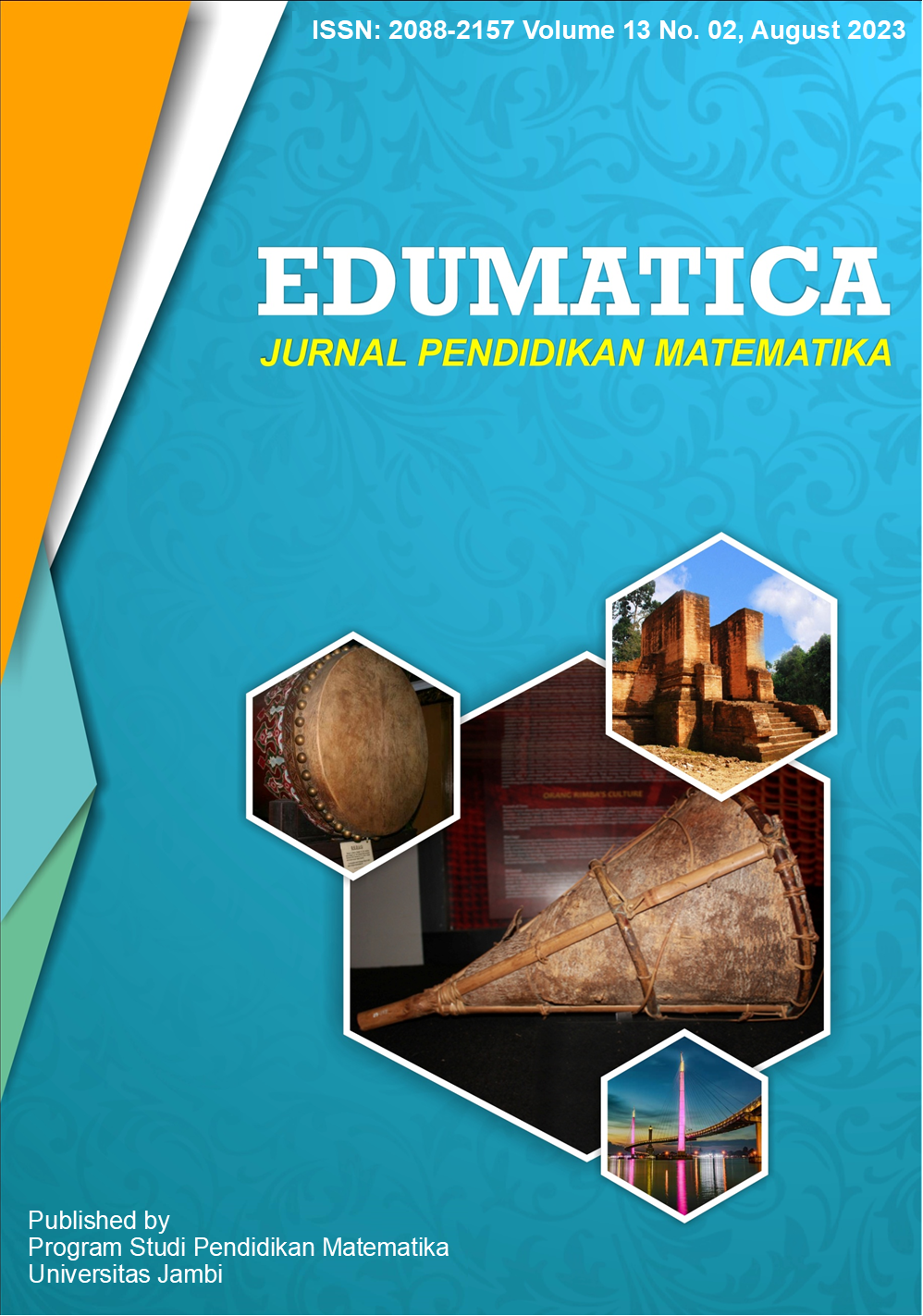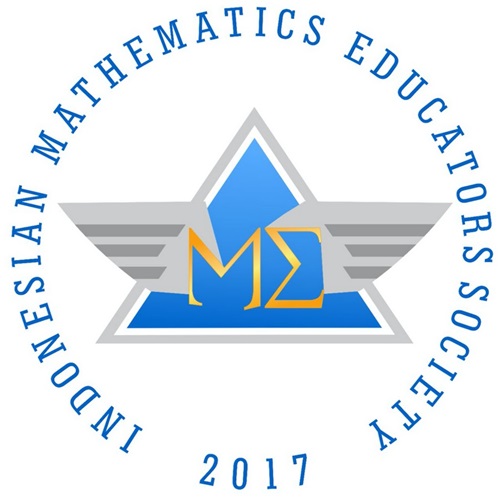Exploration of Fifth Grade Students' Algebraic Thinking in Solving Functional Dimension Problems
DOI:
https://doi.org/10.22437/edumatica.v13i02.24925Keywords:
algebraic thinking, math function, number patternAbstract
This study aims to investigate the algebraic thinking skills of fifth grade elementary school students in solving functional dimension problems. The type of research is descriptive qualitative. The subjects in this study were 131 grade 5 students from two private elementary schools in Surakarta, Central Java, Indonesia. The data collection instrument used was 5 questions on the dimension function algebraic thinking test adopted from Raslton which consisted of 2 numerical pattern questions and 3 picture pattern questions. Prior to use, the questions were first validated by three elementary school mathematics learning experts and tested on 10 students who were not included as research subjects. This research is limited to data analysis of 89 students who belong to the category of moderate algebraic thinking skills obtained from the test results. Data analysis was carried out by analyzing students' answer documents in solving algebraic thinking test questions. Document analysis is focused on solving steps and strategies used to solve problems. The results showed that students were more able to solve linear patterns than nonlinear patterns. Students are also more able to solve numerical patterns than picture patterns. In addition, the strategy used to solve numerical patterns is to determine multiples of numbers and identify the differences between terms in the pattern. Whereas in solving of picture patterns, the strategy used is to draw patterns and identify differences between terms in patterns. This study concluded that most of the subjects in the moderate category were able to demonstrate algebraic thinking skills in functional dimensions.
Downloads
References
Afonso, D., & Mc Auliffe, S. (2019). Children’s Capacity for Algebraic Thinking in the Early Grades. African Journal of Research in Mathematics, Science and Technology Education, 23(2), 219-232. https://doi.org/10.1080/18117295.2019.1661661
Agustyaningrum, N., Sari, R. N., Abadi, A. M., & Mahmudi, A. (2020). Dominant Factors that Cause Students’ Difficulties in Learning Abstract Algebra: A Case Study at a University in Indonesia. International Journal of Instruction, 14(1), 847-866. https://doi.org/10.29333/IJI.2021.14151A
Aspari, A. A., & Anggraini, A. A. (2018). PENGARUH MODEL PEMBELAJARAN KOOPERATIF JIGSAW, KONVESIONAL DAN KEDISIPLINAN BELAJAR TERHADAP HASIL BELAJAR BAHASA INGGRIS. Wanastra: Jurnal Bahasa Dan Sastra, 10(2). https://doi.org/10.31294/w.v10i2.4049
Basir, M. A., Waluya, S. B., Dwijanto, & Isnarto. (2022). How Students Use Cognitive Structures to Process Information in the Algebraic Reasoning? European Journal of Educational Research, 11(2), 821-834. https://doi.org/10.12973/eu-jer.11.2.821
Blanton, M. L., & Kaput, J. J. (2011). Functional Thinking as a Route Into Algebra in the Elementary Grades. 5-23. https://doi.org/10.1007/978-3-642-17735-4_2
Bye, J. K., Harsch, R. M., & Varma, S. (2022). Decoding Fact Fluency and Strategy Flexibility in Solving One-Step Algebra Problems: An Individual Differences Analysis. Journal of Numerical Cognition, 8(2), 281-294. https://doi.org/10.5964/jnc.7093
Demonty, I., Vlassis, J., & Fagnant, A. (2018). Algebraic thinking, pattern activities and knowledge for teaching at the transition between primary and secondary school. Educational Studies in Mathematics, 99(1), 1-19. https://doi.org/10.1007/s10649-018-9820-9
Eriksson, H., & Eriksson, I. (2020). Learning actions indicating algebraic thinking in multilingual classrooms. Educational Studies in Mathematics, 106(3), 363-378. https://doi.org/10.1007/s10649-020-10007-y
Kamol, N., & Har, Y. B. (2010). Upper Primary School Students’ Algebraic Thinking. Proceedings of the 33rd Annual Conference of the Mathematics Education Research Group of Australasia, (July), 289-296.
Kieran, C. (2004). Algebraic Thinking in the Early Grades: What is it?
Kriegler, S. (2007). Just What is Algebraic Thinking? Introduction to Algebra :TeacherHandbook, 1-11.
Lew, H.-C. (2004). Developing Algebraic Thinking in Early Grades: Case Study of Korean Elementary School Mathematics 1. The Mathematics Educator, 8(1), 88-106.
Nur, J. (2020). Penerapan Kemampuan Literasi Matematika Pada Pembelajaran Matematika Abad 21. Jurnal Intelegensia, 5(1), 1-10.
Obara, S. (2019). Pre-service teachers exploring the role of pattern-based reasoning in the context of algebraic thinking. Eurasia Journal of Mathematics, Science and Technology Education, 15(11). https://doi.org/10.29333/ejmste/109262
Papadopoulos, I., & Patsiala, N. (2019). When the “Tug-of-War” Game Facilitates the Development of Algebraic Thinking. International Journal of Science and Mathematics Education, 17(7), 1401-1421. https://doi.org/10.1007/s10763-018-9928-5
Pinnock, E. (2021). Teaching and learning algebraic thinking with 5-to 12-year-olds: the global evolution of and emerging field of research and practice. Research in Mathematics Education, 23(2), 226-230. https://doi.org/10.1080/14794802.2020.1725613
Pourdavood, B. R., McCarthy, K., & McCafferty, T. (2020). The impact of mental computation on children’s mathematical communication, problem solving, reasoning, and algebraic thinking. Athens Journal of Education, 7(3), 241-254. https://doi.org/10.30958/aje.7-3-1
Pratiwi, V., Farokhah, L., & Abidin, Z. (2019). a Lesson Design of Algebraic Thinking in Elementary School As an Efforts To Develop Mathematical Literation in Industrial Era 4.0. PrimaryEdu - Journal of Primary Education, 3(2), 61. https://doi.org/10.22460/pej.v3i2.1376
Pratiwi, V., Herman, T., & Lidinillah, D. A. M. (2018). Upper Elementary Grades Students’ Algebraic Thinking Ability in Indonesia. IJAEDU- International E-Journal of Advances in Education, III(9), 705-715. https://doi.org/10.18768/ijaedu.390554
Ralston, N. C. (2013). The Development and Validation of a Diagnostic Assessment of Algebraic Thinking Skills for Students in the Elementary Grades. 45.
Sibgatullin, I. R., Korzhuev, A. V., Khairullina, E. R., Sadykova, A. R., Baturina, R. V., & Chauzova, V. (2022). A Systematic Review on Algebraic Thinking in Education. Eurasia Journal of Mathematics, Science and Technology Education, 18(1), 1-15. https://doi.org/10.29333/EJMSTE/11486
Siemon, D., Callingham, R., Day, L., Horne, M., Oates, G., Seah, R., … Horne, M. (2022). Key Shifts in Thinking in the Development of Mathematical Reasoning Key Shifts in S tudents ‘ Capacity to Generalise : A Fundamental Aspect of Algebraic Reasoning.
Sugiarti, L., & Retnawati, H. (2019). Analysis of student difficulties on algebra problem solving in junior high school. Journal of Physics: Conference Series, 1320(1). https://doi.org/10.1088/1742-6596/1320/1/012103
Sun-Lin, H.-Z., & Chiou, G.-F. (2019). International Forum of Educational Technology & Society Effects of Gamified Comparison on Sixth Graders’ Algebra Word Problem Solving and Learning Attitude. Source: Journal of Educational Technology & Society, 22(1), 120-130.
Sunardi, S., Kurniati, D., Sugiarti, T., Yudianto, E., & Nurmaharani, R. (2018). Pengembangan Indikator 4C’s yang Selaras Dengan Kurikulum 2013 Pada Mata Pelajaran Matematika SMP/MTs Kelas VII Semester 1. AdMathEdu : Jurnal Ilmiah Pendidikan Matematika, Ilmu Matematika Dan Matematika Terapan, 7(2), 197. https://doi.org/10.12928/admathedu.v7i2.9159
Toman, U., & Gokburun, O. (2022). What Was and Is Algebraic Thinking Skills at Different Education Levels? World Journal of Education, 12(4), 8. https://doi.org/10.5430/wje.v12n4p8
Tursucu, S., Spandaw, J., & de Vries, M. J. (2020). Search for Symbol Sense Behavior: Students in Upper Secondary Education Solving Algebraic Physics Problems. Research in Science Education, 50(5), 2131-2157. https://doi.org/10.1007/s11165-018-9766-z
Venenciano, L. C. H., Yagi, S. L., Zenigami, F. K., & Dougherty, B. J. (2019). Supporting the Development of Early Algebraic Thinking, an Alternative Approach to Number. Investigations in Mathematics Learning, 12(1), 38-52. https://doi.org/10.1080/19477503.2019.1614386
Downloads
Published
How to Cite
Issue
Section
License
Copyright (c) 2023 Windy Anggita Maharani, Masduki Masduki

This work is licensed under a Creative Commons Attribution-NonCommercial-ShareAlike 4.0 International License.







